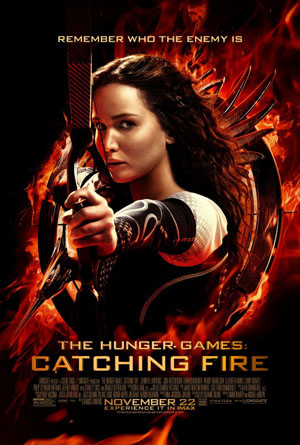 THE HUNGER GAMES: CATCHING FIRE
THE HUNGER GAMES: CATCHING FIRE(PG-13)
**** (out of 5)
November 22, 2013
STARRING
Jennifer Lawrence as KATNISS EVERDEEN
Liam Hemsworth as GALE HAWTHORNE
Josh Hutcherson as PEETA MELLARK
Woody Harrelson as HAYMITCH ABERNATHY
Donald Sutherland as PRESIDENT SNOW
Elizabeth Banks as EFFIE TRINKET
Lenny Kravitz as CINNA
Stanley Tucci as CAESAR FLICKERMAN
Philip Seymour Hoffman as PLUTARCH HEAVENSBEE
Studio: Lionsgate
Directed by: Francis Lawrence
BY KEVIN CARR
Listen to Kevin’s radio review…
The most terrifying moment in “The Hunger Games: Catching Fire” is the opening shot. After the Lionsgate logo fades away, we see a slow helicopter shot over a forest of pine trees. The moment I saw this, my heart sank and I started to sweat.
Dear God, I thought. They made another “Twilight” movie.
Fortunately, the “Twilight” remnants faded away rather quickly (though not completely, and I’ll get to that in a second). Overall, this is a good thing because while many people consider “The Hunger Games” to be the next “Twilight” franchise, there’s a lot more to the movies than some sappy, weepy, mopey lust-and-control “love” story. In fact, “The Hunger Games” makes some really astute political points and offers itself as a social commentary beyond jut being a hero’s journey.
Still, there are wannabe “Twilight” elements that hold the first act of the film back. This first act is the real problem with this movie, spending too much time in set-up and not enough time moving the story along. More over, the script goes out of its way to hammer home the not-quite-believable love triangle between Katniss (Jennifer Lawrence), Peeta (Josh Hutcherson) and Gale (Liam’s Hemsworth).
This is forgivable to me, for no other reason than I know it’s studio micro-management trying to suck up some of that “Twilight” box office juju. The other reason this is forgivable is that while the love triangle does exist in the book, it subtly satirizes the “Twilight” behind-the-scenes phenomena. Kristen Stewart and Robert Pattinson were pushed into an off-screen relationship to help sell more tickets and further enslave the Twi-hards’ emotions. This was evidenced by the fact that the moment the series was over, Stewart was banging a director from her other film while Pattinson was trying to distance himself from the character of Edward.
I can’t say whether I’m giving “The Hunger Games: Catching Fire” too much credit, but I like to think this was the case, just as I like to think the sweeping shot of pine trees in the opening of the film was director Francis Lawrence’s simultaneous tip of the hat to “Twilight” fangirls and wink/nod to the audience that doesn’t want to sit through that nonsense again.
So while these pervasive elements that studios demand be in films are replete through the first part of “The Hunger Games: Catching Fire,” things improve greatly once the Hunger Gaming starts.
This sequel sees Katniss and Peeta roped back into another year of the Hunger Games, this time facing off against previous winners. The stakes are higher, and the game is more dangerous. No longer are we shocked at the brutal slaughter of twelve year olds. Instead, we see the contenders in a real game, a real battle of wits, which takes place not just against each other but the arena itself.
A lot of the same beats and points are made in this movie, but things are different. Katniss comes at it with a level of experience, and we see a deeper purpose to the games. There’s more intrigue behind the scenes as the oppressive government contemplates what to do with the monster they have created, and we get a better glance at how the Hunger Games themselves are used in the oppression.
Just as the opening of the film is the weakest part, the ending has a bit to be desired. Like any trilogy, there’s going to be many things unresolved at the end of the second film. “The Empire Strikes Back” is the quintessential example of this, but others like “The Matrix Reloaded,” “The Two Towers” and “Back to the Future: Part II” are other fine examples.
The second film in a popular series serves as a lead in to the climactic third film. However, there is more bitter in this bittersweet ending to “The Hunger Games: Catching Fire” because Hollywood in its infinite wisdom greed will be splitting the final book into two installments. So that feeling of unresolve will continue through another film.
While “The Hunger Games: Catching Fire” is a fine film with plenty of action and a lot more to say than what we’ve seen recently in the hopeful young adult literature adaptations, the bookends to it keep it from being a great movie.
Podcast: Play in new window | Download
